Final HOTSPOT-2 workshop, November 2024
From 19 to 21 November 2024, the final HOTSPOT-2 workshop was held at the University of Cape Coast ans surrounding areas. The first day results of the project were presented to fisher folks and fish mongers in Anomoba and Elmina. On the second day, first and second year science students at two schools in Anomabo and Elmina were engaged in poster exhibitions, project presentation, and microscope work. The last day was dedicated to a stakeholders’ dissemination workshop.
Learn more and see pictures from the events
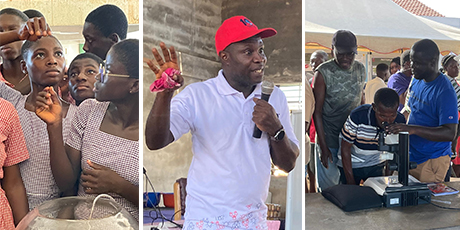
Planning of field campaign, April 2024
The next HOTSPOT2 field campaign is under planning. The students from Ghana and Denmark have been meeting over Zoom to discuss the experimental set up to investigate the effects of emerging contaminants on coastal ecosystems. Axel Alejandro Andersen Arias and Sofia Ramirez-Ekner from DTU will join Ahamed Ali Salim and Justice Apetorgbor from UCC in April-May 2024 for a series of laboratory experiments in UCC – more to come of their research later.
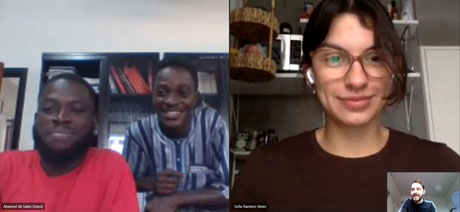
Project meeting at DTU, November 2023
In November 2023 HOTSPOT partners from the University of Cape Coast visited DTU, to discuss the activities of the final project year, the data and publications that are underway and the collaborations beyond the project period. We are now ready to tackle the final project year including a PhD and post-graduate course on marine pollution, joined student experiments on emerging contaminants, diverse dissemination activities, scientific publications and the final project meeting.
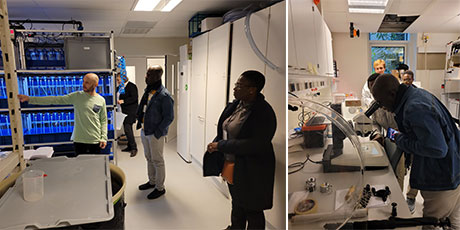
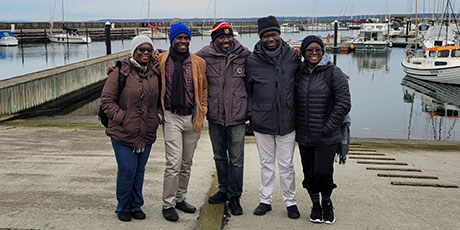
Field and labwork, Ghana, August 2023
Researchers and students from DTU Aqua and University of Cape Coast are doing fieldwork in Ghana in August 2023 as part of the HOTSPOT 2 project. The aim of the work is to establish a baseline description of the oceanography and plankton community in the Bay of Guinea during the rainy season. In addition, analyses are conducted of toxic substances in the seawater and their impact on zooplankton and potential up-concentration in the food web.
Learn more and see more pictures from the field and lab work
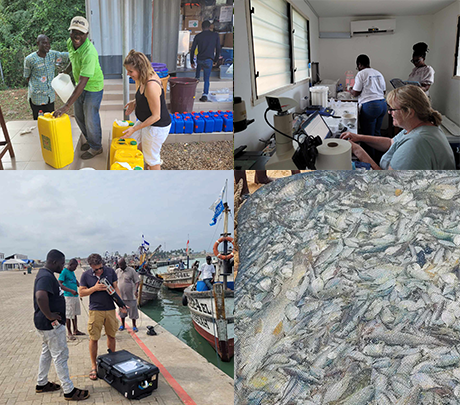
HOTSPOT student in the ASLO conference, June 2023
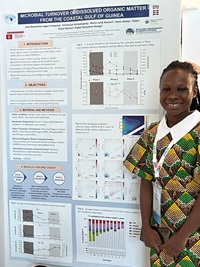
HOTSPOT student, Ama Kwartemaa Agyei Frimpong, participated in the conference of American Society of Limnology and Oceanography (ASLO) in Palma de Mallorca in June 2023. Ama’s poster 'Microbial turnover of dissolved organic matter from the coastal Gulf of Guinea' was based on the data from the 1st field campaign of HOTSPOT2, and gathered a lot of interest among ASLO participants.
Workshop on scientific writing and environmental impact assessments, March 2022
As data is ticking in, HOTSPOT students will need to start writing their manuscripts and the environmental professionals will start working on the impact assessments of diverse activities. To facilitate this, HOTSPOT organized a one-week workshop with lectures from senior participants and collaborative efforts to advance HOTSPOT manuscript.
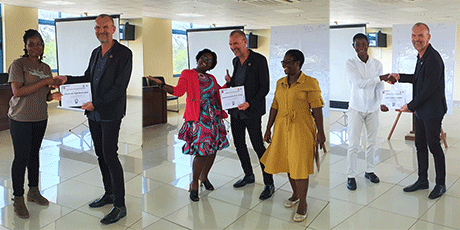
Coordinator of the HOTSPOT project, Torkel Gissel Nielsen, presents workshop participants with diplomas.
Field campaign of HOTSPOT 2, November 2021
HOTSPOT 2 was kicked off with an intensive field and lab campaign, including both multiple stressor experiments in the container lab and sampling along transects from Elmina harbor towards the open sea. The transect study will both give insights into the biodiversity and functioning of the pelagic marine ecosystem and into the concentrations and effects of emerging contaminants, whereas the laboratory studies will complement HOTSPOT data on the effects of multiple stressors on tropical plankton.
Stakeholder webinar, December 2020
On 16 December 2020, the Centre for Coastal Management at the University of Cape Coast, Ghana held an online stakeholder webinar in collaboration with the National Institute of Aquatic Resources at Technical University of Denmark to discuss the findings of the HOTSPOT project. Download programme for the webinar
Field equipment test, November 2019
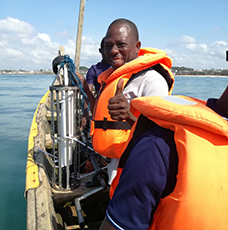
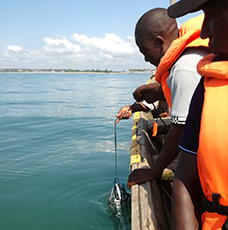
HOTSPOT field equipment has arrived and is being tested. The first CTD measurements were taken outside Cape Coast, and the full field campaigns are being scheduled to start in the end of 2019.
Mecocosms experiments in new container labs, October-November 2019
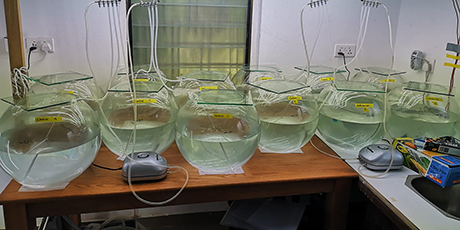
HOTSPOT mesocosms experiments took place in the new container labs of the UCC in October-November 2019. The purpose of the experiment was to investigate the responses of the plankton community to the contamination by crude oil, cadmium and plastic.
HOTSPOT Student projects, October-November 2019
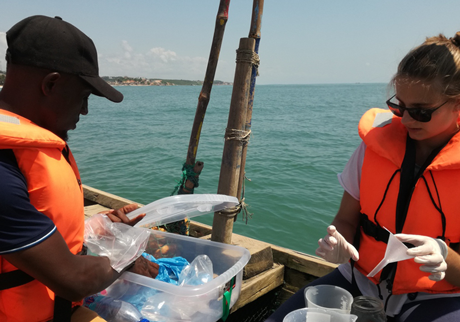
Students from University of Cape Coast and Technical University of Denmark were participating in the second experimental campaign at the UCC in October-November 2019. The project included investigations into the combined effects of cadmium and crude oil in the ecophysiology of plankton, and in bioaccumulation of heavy metals outside Cape Coast.
Student training at DTU, August 2019
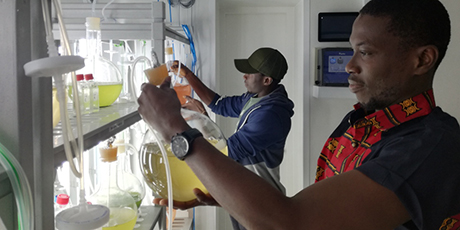
Two HOTSPOT students, Ernest Obeng Chuku and Delove Asiedu, visited DTU in August 2019 for a 2-week training on zooplankton methodology.
Danida visiting the HOTSPOT Project, March 2019
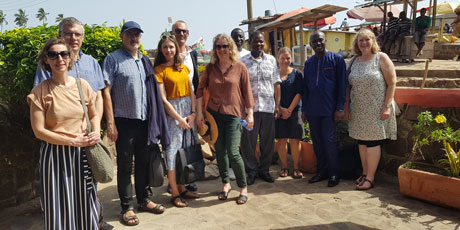
A Danida delegation from Denmark visited the HOTSPOT PhD Course at Univerity of Cape Coast University 27-28 March 2019. In that connection they participated in a excursion to Elmina Habour and Fish Market. Here they got an impression of the environmental challenges (sewage, oil, plastic and overfishing), that the coastal zone and it population is exposed to.
HOTSPOT Course, March 2019
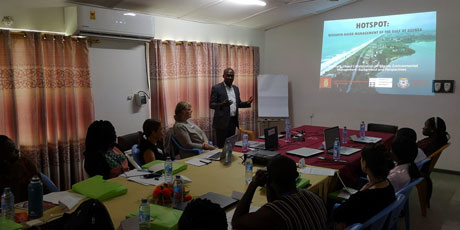
Course in multiple stressors in tropical marine environments for PhD, Masters, Students and Professionals, 25-30 March 2019, Ghana.
HOTSPOT Student Projects, Autumn 2018
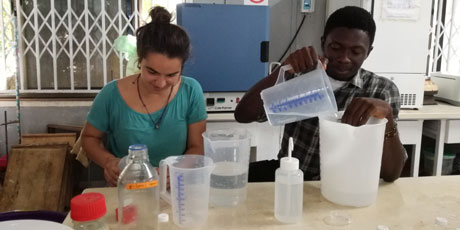
HOTSPOT hosts both master and bachelor projects. In the first campaign in the autumn 2018, students from University of Cape Coast and Technical University of Denmark worked together to investigate the combined effects of pyrene, microplastics, nickel and heat waves on the tropical copepods.
HOTSPOT Kick-off Meeting, March 2018
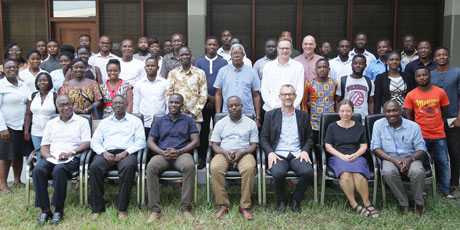
The HOTSPOT kick-off meeting took place in March 2018 at the University of Cape Coast, Ghana.